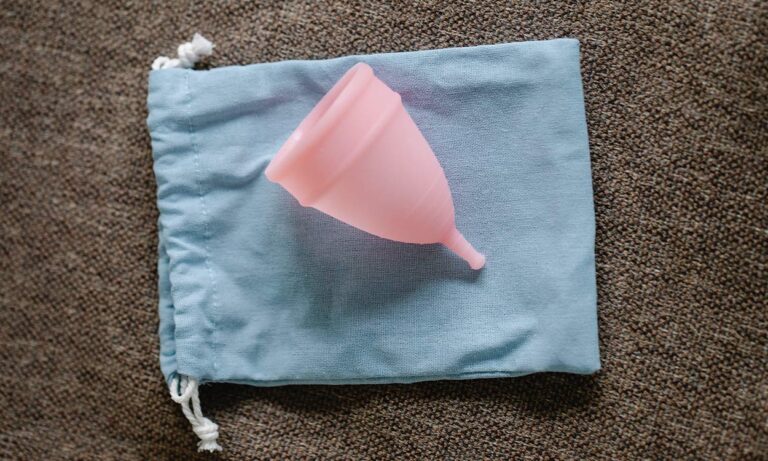Viral TikTok video claims menstrual cups can cause pelvic organ prolapse. Is it true?
A recent video, which was shared on TikTok by user @eely.vickere and has already accumulated over 2.9 million views and 425,000 likes, is making waves among gen Zers on the platform for supposedly proving that menstrual cups—which had so far been celebrated for their overall practicality—can cause pelvic organ prolapse.
As social media users and experts alike continue to argue online over whether that claim is true or unfounded, I looked into it all in an attempt to debunk the latest period-related myth to join a long list of misconceptions and taboos.
What is pelvic organ prolapse?
First things first, it’s important that I start by explaining what the condition that is allegedly linked to the use of the sustainable period product consists of—and why it’s worrying if this claim is proven true.
Pelvic organ prolapse happens when the muscles and tissues supporting the—you guessed it—pelvic organs (the uterus, bladder, or rectum) become weak or loose, in turn moving out of place, pressing into or out of someone’s vagina.
Symptoms include discomfort, a bulge or lump in your vagina and needing to pee more than usual. Treatments for pelvic organ prolapse usually come in the form of pelvic floor exercises, hormone medicines and sometimes surgery.
In most cases however, the condition is caused by pregnancy and childbirth, going through menopause and being overweight—as opposed to wearing a menstrual cup.
How could a menstrual cup hypothetically cause vaginal prolapse?
In case you weren’t among the lucky ones who got to read my 2020 review of my favourite menstrual cup ever, the OrganiCup—which I still use to this day, by the way—let me run you through a quick beginner’s guide to the tampon and sanitary pad alternative.
Long story short, it’s a soft, medical-grade silicone or rubber cup that is inserted into the vagina to catch the blood flow, just like a small vessel. Once inserted, it only needs to be emptied every eight to 12 hours, rinsed under some water, and then put back in.
Unlike other single-use products, the menstrual cup is reusable and can last for a couple of years. All you need to do is to make sure that you sterilise it by boiling it in hot water once you’ve reached the end of your period.
If you’re still confused as to how the small cup stays in place down there, let me tell you, this is where things get interesting, my friend. Once correctly inserted, it pretty much all boils down to suction—meaning that when you ultimately end up taking it out, it’s important that you relax, then pull on the stem only until you can reach the base of your cup and pinch it slightly to release the suction seal and ease it out.
The argument behind the whole prolapse debate is based on the possibility that, over time, the motion of bearing down on your cup for removal could weaken your pelvic floor and result in prolapse—an argument that even the BBC debated in March 2020.
For most cup users, their vaginal canal is short enough for their cup to easily be within reach without them needing to bear down for removal. However, some users with a high cervix report that their cup moves up to a height where it is difficult to remove, and find themselves straining as they bear down to move their cup within reach.
@byallmatters There you have it! We’re answering questions in the comments below. Go! 👀 #organicup #newperiod #menstrualcup
♬ original sound - AllMatters
Can menstrual cups cause prolapse?
It’s important to mention that currently, there are no peer-reviewed studies that show a direct correlation between menstrual cup use and prolapse. Regardless of this, period care company Saalt spoke to board-certified women’s health physical therapist, Doctor Marcy Crouch, to hear what an expert had to say about the claims.
Dr Crouch explained that repeated, prolonged bearing down beyond what you would do to begin an easy bowel movement, or release gas, can compromise the health of a cup user’s pelvic floor. A better alternative would be going into a position like a deep squat, or even a ‘Happy Baby’ pose, to encourage lengthening of the pelvic floor instead of pushing.
Further, she said that if bearing down is necessary, she would instruct people to do it with an open throat. This essentially allows for a pressure exchange to take place that decreases the force on your pelvic floor, while allowing you to safely move your cup lower.
Now back to your question, can menstrual cups actually cause prolapse? It seems that, in a few rare cases, it can lead up to it, yes—maybe. Which also guides me to the second argument presented by the BBC—that cups are not regulated in the first place.
Due to the momentum being gained within the world of sustainable period care, there are now hundreds of cup brands available to consumers online, and many of them are not regulated by health agencies in their country of origin.
Because cups are medical devices, it is important to ensure that any cup you purchase is certified by a reputable governing body. For example, Saalt and OrganiCup (now AllMatters) are both FDA-registered and compliant. This means that the two brands are continually working to ensure the safety and efficacy of their products, including the educational resources they provide.
That being said, if you somehow end up buying a brand that has not been regulated by your country’s health agency, it is possible that the instructions that come with it end up countering the advice you would have been given to avoid prolapse.






